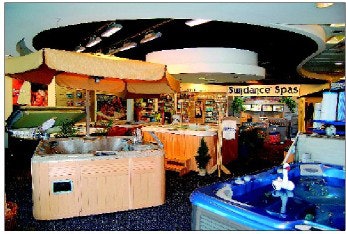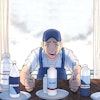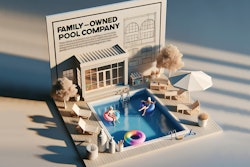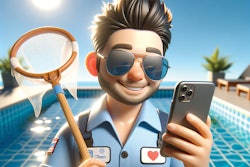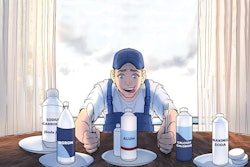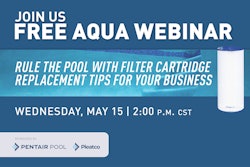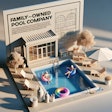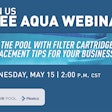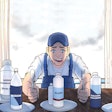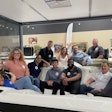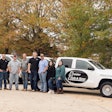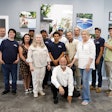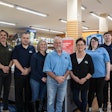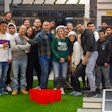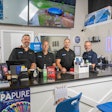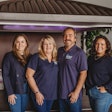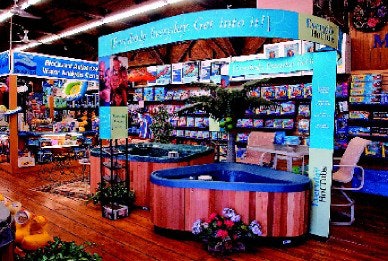
When you experience the four seasons, you're reminded almost daily as you step out the door that change is inevitable. That's a good thing to keep in mind as you shiver through January. The changing weather, however, is but one of the many elements that affects your business. Evolving technology, design trends, consumer buying patterns and today's changing workforce also impact the way you run your business. And since everybody knows that you can either change with the times, or fall behind, AQUA wanted to get a sense of how hot tub dealerships are evolving. To do that, we asked a few dealers about changes they've made to their businesses recently and about those they plan to make in 2007.
To build the value of his business, The Sundance Spa Store in Burlington, Ont., Bill Elliot says he and his partners are in the process of systemizing "everything from accounting to the cash register."
"We also have regimens and manuals for service technicians and delivery crews," says Elliot, "so that whether it's Bob on deliveries today or the new guy, Walter, there's a very specific system for them to follow, and it allows us to have a much more efficient operation."
In 2006, to further systemize the business, The Sundance Spa Store put barcodes on all of its chemicals and accessories. "This allows us to track our customer's buying patterns," says Elliot. "That tells us what we need to do to maximize business and also maximize customer service and satisfaction.
"For example, hot tubs are our focus, but last year we started stocking more GFI boxes, which are required to run a hot tub. Most people buy it at Home Depot, but we stocked a handful of them out of convenience for our customers. Well, when we looked back, we saw we bought over 100 GFIs last year, and it crept up on us. So this year we're making more of an effort to actually market those and let customers know we have them, rather than having them in the back room. They're a profitable item and they're also extremely convenient for the customer to get from us. The barcoding helps us recognize there's money to be made somewhere we didn't notice, so we're not leaving money on the table."
When Elliot and his partners opened the first Sundance Spa Store five years ago, they planned to expand. "Our plan was to have the first store up and running for two years and then in the third year open up a second store, which we accomplished, and now we hope to have a third open by the end of 2007. It's all part of the big plan."
This growth prompted the dealer to hire a dedicated service technician in 2006. Says Elliot, "We're now stocking a service van to be able to maintain warranty and new service calls."
Elliot says they don't have many changes planned for their showrooms, though they might knock down a wall in the original store's showroom so they can display more tubs. "We have some storage space that might be better suited as showroom space." Currently, the first store has 3,000 square feet of floor space and 12 tubs on display, and if they knock down the wall, they'll get about 600 more square feet and four more tubs on the floor.
But is it really necessary to display so many hot tubs. Elliot explains his merchandising strategy: "Even though 80 percent of our sales may come from one or two models, the others still serve a purpose. They allow people to make comparisons on your showroom floor, so they don't feel compelled to shop around, thinking they haven't seen enough. If you've got a full operating showroom, people come in and they feel like they've shopped around even if they've only been into your one store."
While Elliot stresses that hot tubs are the company's bread and butter, the dealership did add saunas last year to attract customers in the winter. "There's not a whole lot of products that sell well in the winter," he says, "but cold and sauna tend to go together. Plus, you very rarely see a sauna store, so it's an untapped market, and it's got the same appeal of a hot tub for families — it's a family-oriented thing."
Because The Sundance Spa Stores aim to attract customers year-round, they advertise year-round. "Newspaper advertising is a staple," says Elliot. "And we advertise even when we're not having a sale. Traditionally, hot tub companies have ads that call for action immediately, and although that may be effective, not everybody decides over the newspaper Sunday morning that they're going to buy a hot tub. But if we constantly run ads when our competitors are not, it keeps us in people's minds so they think of us when it is time to buy."
Elliot says the dealership also does direct mailing, and is just starting a direct-mailing program tied to an Internet company. "The mailer directs customers to a Web site, and that allows us to collect data on them and then we can do proper follow up."
Closely associating the company with the brand of hot tubs it sells has also helped it attract customers. "A big key to our success is we do everything with branding in mind," says Elliot. "We carry Sundance Spas and we call our stores The Sundance Spa Store. And Sundance has got some recognizable aspect to it. It's hard to key in hot tubs [on a search engine] without Sundance coming up first. Plus, Sundance provides their dealers with a lot of paraphernalia to make the stores look more up to date and more consistent. And people like it when they walk into a store that looks professionally set up."
Throughout 2007, Olympic Hot Tubs will be celebrating its 30th anniversary. "It's also Watkins 30th anniversary, so it coincides nicely," say Alice Cunningham, co-owner of Olympic with her husband, Blair Osborn. "And we'll be just pulling out all the stops, the PR, the advertising, really hitting it home that we're the oldest hot tub company in the Northwest and the most award-winning hot tub company in the Northwest."
While Cunningham did not specify what this advertising and PR program would involve, she did say she'll continue to voice the company's radio commercials, which she started doing about year ago. "And that has worked quite well," she adds. "But the owner doing an ad doesn't always work and it wouldn't have worked for me if I hadn't gotten a voice coach. She gave me the confidence to do it."
The voice coach helps Cunningham connect with her audience, since she wants to avoid sounding like she's reading from a script announcing a big blowout sale. "What we're trying to do is make friends with people so that when they wake up one day and think, 'I want a hot tub,' they think of us.
"People now are wary about buying things — they're afraid of salespeople, they don't want to be sold," says Cunningham. "So I'm just trying to establish that I'm a friendly, honest person and that when you come to my store, that's what you'll encounter: friendly, honest people. And we have products that give value. So people hear my voice, they hear my words, they go to the Web site and come into the store. It's all congruent."
Olympic recently redesigned its Web site since so many consumers shop for hot tubs online before visiting brick-and-mortar showrooms. "I launched it last May and the traffic has been way up since I did that," says Cunningham. Monthly page views have reached 20,000.
Shoppers surfing the net aren't the only ones who think the site is worth perusing. Last fall, the Web Marketing Association honored Olympic and its Web site designer, InfoAdvantage, with a 2006 WebAward for outstanding Web site development. Other winners in the retail category included L.L. Bean, Office Depot, Dell and Nike.
Aside from promoting the company's anniversary, in 2007 Cunningham, along with 40 other Watkins dealers, will focus on ways to improve her business by continuing to implement the Gemini Effect program. Founded by Lee Frederiksen, Ph.D., and David Riley, this program, designed for small to mid-size companies, helps business owners examine their company, assess what they're doing well and what needs to be done better, and then develop and implement step-by-step plans for improvement.
The program has business owners focus on seven "success factors" and for each one, owners survey their employees to find out where they currently stand for each factor. For example, one of the factors, "Support People, But Make Performance Matter," is all about how to best motivate employees, and in the survey, employees are asked to indicate how often they receive praise. Cunningham was a little surprised to find her employees did not feel praised as often as she thought they were receiving it. "We have a company dinner and we celebrate everybody at the dinner, but Lee and Dave said it's much more important to people if they can be recognized much more frequently, even one-on-one from the boss, saying, 'You're on the right track, I appreciate it.'"
Another one of the success factors has to do with having a vision for your company and communicating that to employees. Says Cunningham, "I find that most people in a business, they'll have a staff meeting and they'll talk about what happened yesterday or what is supposed to happen tomorrow or maybe next week or month. But we've consciously tried to get a much longer and longer picture, so that we certainly have a planning calendar for a year out, but we also are looking at the five- and ten-year picture.
"And then the need to communicate that to your staff is really vital, so the internal messaging is very critical. And that's because you want people to buy in, you absolutely want to buy in. Leadership has to do with two things, I think: one is having a vision, and telling your employees that we're going to go down this path if you want to come. Look at the Marines, it's a vision bigger than themselves and people respond to that. Second, once you put that out, your job as the leader is to be the cheerleader, to get them to be the best they can be."
Cunningham is particularly focused on cultivating and retaining her employees because she feels they are her most precious resource. "The workplace is changing dramatically, and that whole top-down pyramid thing is not working," she says. "It's not going to be working because people are so different now, and they have different needs, thoughts, aspirations, desires and motivations for being in the workplace. And in order for a small business to succeed, you have to have everyone participating. Everyone. And you've got to get the best out of them."
Because if employees are not motivated, dedicated and giving superior customer service, you're not going to get the referrals you need, adds Cunningham. "Still, 45 percent of our business is referral, day in and day out, and that's another giant thing I'm working on in the coming year," she says. "We're really re-examining all the ways we touch people after the sale, because we're seeing that we can't afford the kind of person who is just going to buy and not refer. Advertising is just costing more and more, so you have got to turn your customers into ambassadors for you."
Whether it happens in 2007 or later, Amy Barto's long-range goal is to relocate Barto Pool & Spa. The Phoenixville, Pa. dealership is currently housed in a late-1800s train station, but Barto, the general manager, plans to move to a new, state-of-the-art, 7,500-square-foot facility. "We've done really well with what we have, working within the constraints of a 100-yearold building," says Barto. "But I can't air condition in the summer and things like that. In general since I've been in the industry — I grew up here — the industry has gotten so much more professional from just the little mom-and-pop counter shops to high scale retailers, and I want my store to have that same high-scale retail feel and professionalism and set us apart from the spa sitting out in front of Home Depot up on its side."
In the new showroom, Barto plans to display more patio furniture. "One of the untapped areas in our area is good-quality patio furniture," she says. "We have a lot of high-dollar new homes and it's either go to WalMart or go to a specialty retailer across town from me and spend $3,000 for a set. I know there's a middle ground in there, the $1,500 set, that I can tap. So that would be one of the things in a new store I'd try to expand — just more of the whole outdoor environment."
In the meantime, Barto will again be improving the space she's got to work with. "We try to do something that's going to freshen up our retail space every year, and this year's project is adding an upscale gazebo from Visscher Specialties. It has stone pillars and an open-air feel — it's a different look from the other gazebos I've seen. We'll show it with a hot tub inside and some plants and other landscaping. This is an expensive gazebo, and I may not sell a lot of them, but I want customers to walk in the door and get the wow factor and think, 'I wish my backyard could look like that.' Because people buy emotionally, you want something that's going to catch their eye, something that looks fabulous."
Maintaining an attractive, clean showroom is big priority for Barto, and that's part of why she started selling items in BioGuard's Backyard Essentials line. "We brought in their soy candles, yard art, wind chimes and the Joan Baker art," says Barto. "I certainly get few, if any, people coming to my store just for yard art, but we are definitely finding incremental sales in it.
"I had a guy last week who comes in regularly to get his water tested, and he bought one of the Joan Baker stained-glass art panels. I would bet he's thinking of his wife's birthday or something like that, but he's not the kind of guy who likes to go shopping.
The key is that this stuff has to be extremely visually appealing. If it's not in a pretty box or container, don't even bother because if it doesn't catch their eye, they're not going to buy something they didn't come into your store intending to buy."
These items work well for Barto since they beautify her showroom, but don't take up much space. "You know, chlorine is not pretty, but these things make my store colorful, vibrant and more fun. I'm neurotic about keeping the store clean and attractive. If it's not pretty, it doesn't go out on the shelf. We have a back parts room customers can go into where all the orings, pump impellers and that stuff are kept, but it's not immediately visible because nobody needs to see that."
Barto also positions her merchandise to optimize sales. "It's amazing what'll happen if you put 15 buckets of 3-inch tabs in a pyramid somewhere. People will grab it. It might not even matter what the price is, but they think it's on sale and they think it's a good price if it's at the end of the aisle and it's in a mountain. Also, take a page from what the mass merchandisers do, and change your displays monthly, because we do get some customers coming in regularly. And we put impulse items, like fragrances and rubber duckies, near the register."
Many of her merchandising ideas came from seminars she attended at the AQUA Show, says Barto. "We're constantly training and going to manufacturer training sessions because the one thing I've found is that the same thing does not work over and over again. If you don't constantly look for different things to do, different things to try, you're going to get stagnant or you're going to go backwards." An idea Barto got at a recent seminar was to use a simple test in the hiring process, which she plans to do in the coming year when she hires a needed salesperson. Whether it's a personality test or a skills-inventory test, Barto hopes it will help her weed out the undesirable candidates early in the process.
In terms of advertising, "There is no one magic pill," says Barto. "I haven't found a single thing that works, so it means you need to keep reinventing your marketing campaign because if you try to stick with the same plan day in and day out, at least where we are, it doesn't work."
Toward that end, in 2007 Barto plans to do a new "highquality, glossy direct-mail piece," since consumers today are very discriminating when it comes to actually paying any attention to their mail. "If you're not going to do a quality mailing, you might as well not do one at all," she says.
The dealer also recently invested in its Internet presence. "I think in a couple years, the standard big yellow pages is probably going to go the way of the dinosaur, so we have paid to be in upgraded programs on SuperPages.com so that our listing comes up higher on the page. If you did a search for pool companies in our area, maybe 30 will come up, but they're not in alphabetical order — you pay to be on higher positions on the page."
